-
Adopt
-
Veterinary Care
Services
Client Information
- What to Expect – Angell Boston
- Client Rights and Responsibilities
- Payments / Financial Assistance
- Pharmacy
- Client Policies
- Our Doctors
- Grief Support / Counseling
- Directions and Parking
- Helpful “How-to” Pet Care
Online Payments
Emergency: Boston
Emergency: Waltham
Poison Control Hotline
-
Programs & Resources
- Careers
-
Donate Now
Join the Angell Alumni Facebook Group
The Angell Alumni Facebook Group allows you to connect with other Angell alum
and exchange information in a secure setting. You can also use it to connect with
classmates, stay informed of Angell news or Alumni events, and enjoy articles by
Angell specialists on current veterinary techniques, medications, and innovations.
Only Angell Alumni who request to join the Facebook Group have access.
To join, simply:
1) Log onto Facebook
2) Click this link: “Join our Angell Alumni Facebook Group”
3) Select “Request to Join.”
INSIDE
Inside Alumni News Summer 2024
Helping Shelters Struggling with Overcrowding
Neal Litvack, MSPCA-Angell President

According to Shelter Animals Count, a national database for animal rescues and humane societies, the population of animals in shelters across the US increased by almost a quarter million in 2023. Unfortunately, not only are we seeing an alarmingly high rate of pet surrenders and abandonment, but homeless animals are entering shelters and staying for more extended periods. Right now, the influx of dogs — especially larger dogs — is incredibly taxing for animal shelters in certain areas of the country (e.g., those in the Southeast, Midwest, Texas, and California). There’s no room to house them, and overcrowding is becoming a real issue.
There are several reasons why shelters are inundated with animals. Inflation has made everything more expensive for pet owners — from food and supplies to affordable medical care, especially for necessary procedures like spaying and neutering. As our alumni know all too well, many owners become unable to care for their animals and are put in a position where they believe they have no choice but to surrender their pets. On the animal hospital and shelter side, financial hardship is directly connected to the national shortage of veterinarians and technicians. Shelters lack the ability to recruit and retain staff, making it harder to facilitate adoptions for people who can adopt.

The other more significant issue is the postpandemic return to work and rental housing. People who adopted pets during the COVID pandemic find they cannot care for them now because they’ve had to return to their workplace, either part- or full-time. Due to financial constraints, some pet owners cannot find rental buildings that allow pets, especially large dogs or certain breeds like pit bulls.
In Massachusetts — Boston in particular — animal shelters have seen their share of surrenders, primarily due to the city’s lack of affordable housing for owners. Because of this, our Advocacy team is pushing for legislation prohibiting housing and insurance restrictions based on dog breeds, including pit bulls.
The MSPCA-Angell worked hard during the pandemic to ensure prospective owners who expressed an interest in adopting could keep their pets — and now we’re trying to relieve the burden that overcrowded shelters face outside of the state. One of our most significant endeavors is transporting as many homeless animals to Massachusetts as possible. Our relocation program targets shelters with the greatest need, and we prioritize large-breed and senior dogs in our selection to assist them.
While relocation alone cannot solve the problem of pet homelessness, we are using our resources to address the source of the issue. To start, we’re helping shelters implement more aggressive spay/neuter programs and teaching them how to reach out to the public to ensure that animals are sprayed or neutered. We are also assisting shelters in setting up services and facilities to initiate community outreach programs aimed at pet owners who are unable to reach a shelter or lack access to medical attention, food, or supplies.
At the MSPCA-Angell, we host numerous events throughout Massachusetts annually, including no-fee adopt-a-thons — and we teach shelters outside the state how to increase adoptions at their organizations. For example, we helped Berkeley Animal Center establish a series of fee-waived dog adoption events in South Carolina. Then, we sent our staff down to the shelter to help model how to operate it and provide staffing support to handle the increased activity.
Animals need our help more than ever. While considered a last resort, euthanasia rates for dogs have increased significantly after a 20-year decline because shelters are being pushed to the brink. (In contrast, euthanasia rates for cats have been decreasing.) Sadly, this trend of rising euthanasia rates for dogs is expected to continue. But alongside generous Angell alumni like Ruth Marrion, DVM, DACVO, PhD who volunteers her time at our Nevins Farm shelter in Methuen, and thanks to our tireless staff and generous donors, we are striving to help minimize this trend. Despite enormous challenges, we placed more than 10,500 animals — more than any prior year — into loving adoptive homes in 2023. And we hope to do even more in the coming years.
Renovations Planned for Angell’s Clinical Laboratory
Ann Marie Greenleaf, DVM, DACVECC-SA
Chief of Staff, Angell Animal Medical Center
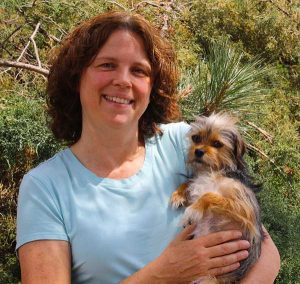
The MSPCA-Angell clinical laboratory provides our clients with expert analysis of their pet’s health and serves as a crucial repository of information for our shelter and law enforcement staff.
The demand for clinical lab services has significantly increased with the opening of a new Emergency and Critical Care Unit in 2022 and the processing of all samples for Angell West, Angell at Essex, and the Boston Clinic. We need a more extensive, high-capacity facility to house our current advanced technological tools and provide adequate storage. The current lab — initially built in the basement of 350 S. Huntington Ave. more than 50 years ago — poses a few challenges. The presence of asbestos in the floors and ceilings restricts renovation.
Additionally, the existing space lacks sufficient electrical capacity and requires a new HVAC system to provide better ventilation to operate safely and effectively. There was a need to find a space large enough to accommodate the upgrades — and that space is the first floor of Angell.

The lab’s renovation is planned in two phases. The first phase involves building the new space while the current lab remains open and operational. The equipment will be moved from the basement to the first floor in the second phase.
With the evolution of remote work opportunities and digital library resources, we are able to remove parts of the Communications Center, the Library, and the offices in the first-floor corridor. An area will be designated for dropping off specimens. Microbiology, histology, and new offices will be on the left side of the corridor. The main laboratory and blood bank will be on the right side. The updated necropsy lab — recently renovated in 2015 — will remain in the basement to conserve space. Angell’s necropsy lab is only one of two such labs in Massachusetts, so we’re frequently called upon to conduct analyses for the city of Boston and law enforcement teams.
The new setup will improve Angell’s efficiency and enhance communication within and between the lab and other services at the hospital. Currently, Pathology staff are cramped and are often required to relocate to different parts of the hospital with their laptops, limiting their access to support resources and prolonging processes. With the increased square footage of the new space, including new work benches, staff can work side-by-side and improve work efficiency.
Moving the clinical lab to the first floor will allow us to bring microbiology services back in-house. We have outsourced this service for the past six years due to a lack of space in the basement, where we couldn’t house the necessary matrix-assisted laser desorption ionization (MALDI) system (a diagnostic tool that helps identify bacteria via DNA analysis in just 10 minutes).
Angell is a best-in-class animal hospital, and clients depend on us to provide their animals with the highest level of care. The lab renovation will ensure immediate access to our life-saving resources and technologies and provide our dedicated medical staff with the tools and space to perform advanced diagnostic procedures.
Angell Internships – Then and Now
Douglas Brum, DVM (Intern Class of ʼ86)
Joel Kaye, DVM (Intern Class of ’91)
Angell Alumni Co-Directors
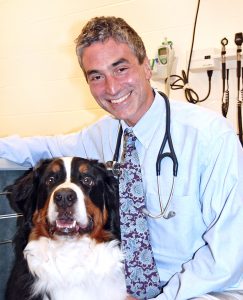
When we think back to our Angell internships, the differences between our program 35 years ago (give or take) and today’s program are staggering.
It seems unbelievable by today’s standards, but during our internships, Angell was the only emergency animal hospital in Boston. As interns, we were 25 years old, had just graduated from vet school, and were “the veterinarians” on call for the city. We had to be prepared for everything and relied heavily on the seasoned nurses to help us at 2:00am. There was no one to call for help. Surprisingly, we were able to stabilize most patients and just had to wait until 8:00am rounds to get the help we needed. Sometimes, the help was discussing future treatments and formulating a plan for the day, and other times, it was letting us know just what we should have done differently.
Needless to say, we grew up quickly and saw an incredible volume of cases. The sheer number of cases we saw quickly translated into invaluable experience in just a short time. Those first few months of the internship were terrifying. We had one overnight and one late night shift a week — for the entire year (aside from a month of surgery and two weeks of pathology). For the overnights and late nights, we would come in by noon, check on our patients, go on rounds at 1:00pm, then take care “of all the stuff,” and start our clinic shift at 5:00pm. Thankfully, there would usually be a few lingering staff clinicians in the hospital until 10:00pm or so, but after that, it was just us.
When and if things slowed down in the ER, the late-night person could leave around 11:00pm. Then, you were on your own until 8:00am the following day. If something came in that needed emergency surgery, we did it. There was no surgeon to call. We did anything from corneal lacerations to gastric torsions. The only thing we could call a surgeon in for was an animal needing emergency spinal surgery.
After rounds, we stayed and cared for all our cases until they were all set. Sometimes, we left at 6:00pm, but many times, we were still in the hospital until 9:00pm or 10:00pm. Obviously, this type of work schedule was not in the best interests of the patients (or the doctors), but there was this feeling that if others had done it before us, we could too. It was like a badge of honor.
Over the years, many more emergency and specialty hospitals opened, and standards of care dramatically improved. The Angell intern program continues to be very challenging, and interns still work very hard, but things have changed. Cases are far more complex — one case now could take as much time and effort as five cases 35 years ago. It would not be uncommon for us to have well over 10 cases in the hospital, and somehow, we could actually take care of them all. Now, that would simply be impossible. The caseload of the hospital has increased significantly, as has the staff. We had a total of nine interns and about six residents for the entire hospital. Now, we are going on 18 interns and dozens of residents.
Interns today also have much more support, especially in their first few months. There are residents to help on the overnights and surgeons to call for procedures. No one does 30-hour shifts. Interns get elective rotations. There is much more to know now and more to expect from veterinary care. Every year, the intern program changes a bit to improve the learning experience. Changes may sometimes be small, but they add up to huge differences over the years.
Yet, even with all the changes, there are still some similarities: a substantial caseload, having primary case responsibility, getting an incredible amount of experience in a single year, bonding with your fellow interns, learning how to deal with difficult clients, sleep deprivation, and the fact that the year is probably going to be the most challenging one of your life. It certainly was for us.
It is a much different and better program now, but when the new interns graduate, they will always wear that “Angell badge of honor” — and we will always be proud of them.
Looking Back: An Intern Year in Review
William Downs, DVM (Intern Class of 2024)

Being accepted into the Angell Animal Medical Center internship program was exciting and nervewracking. As a recently graduated veterinarian, I knew this internship would be a formidable challenge and an excellent opportunity to acquire valuable work experience. The prospect of collaborating with such an accomplished and esteemed team of veterinary experts was indeed thrilling. At the same time, the imminent start of the internship also evoked excitement yet anxiety. The rigorous nature of the program and the demanding expectations prompted doubts regarding my readiness to tackle the arduous trials that lay ahead. Would I be able to endure long hours, challenging cases, and emotional strain? As it turns out, I was not the only intern grappling with apprehensions. The camaraderie that developed between my fellow interns and me proved to be a salient factor in my internship experience. We drew on one another for support, encouragement, and comic relief throughout the program, and I remain deeply appreciative of the connections that blossomed between us and the collective knowledge we gained at Angell.
The life of a veterinary intern is not for the faint of heart. The protracted hours, the taxing cases, and the toll on one’s emotions can be particularly onerous for new graduates. Nevertheless, the support and mentorship of my fellow interns, staff doctors, and the Angell team enabled me to navigate these obstacles and emerge stronger. Despite the challenges, I was fortunate to encounter many rewarding experiences during my internship. Witnessing the exultation of owners as their beloved animals fully recovered was a gratifying and irreplaceable experience. Even in cases where we were not as successful, I felt a sense of pride in knowing that we had provided compassionate and effective care to the best of our abilities.
One of my most significant achievements during our internship was the quantity of knowledge and experience we accumulated. While the initial few months were challenging as we adjusted to the pace and demands of the job, we rapidly gained proficiency and flourished. We garnered exposure to diverse perspectives, and I am confident that these experiences will serve us well in our future veterinary careers. Reflecting on my internship experience, I am grateful for the opportunities and tribulations I encountered. Though our class faced numerous relentless moments throughout the program, I recognize that this experience will continue to transform us into ever-improving doctors.
Collaboration with a cohort of talented and driven interns was one of the most valuable aspects of my internship at Angell. From the beginning, I was struck by the exceptional level of mutual support fostered among us. As we embarked on the uphill journey of honing our craft, we relied upon each other for guidance, encouragement, and inspiration. Our bonds grew stronger with each passing day as we navigated the myriad of challenges that confronted us. Whether it was grappling with the complexities of a case, working through the wee hours of the morning, or simply lending a listening ear to a colleague in need, we were united in our commitment to helping each other. Through this collective effort, we forged a sense of community that transcended the confines of our internship and permeated our lives. Such bonds are essential to the very fabric of the veterinary profession as they foster a sense of community and support that is vital to our collective well-being, and they instill in us a deep sense of purpose and drive essential to our professional success. By cultivating a culture of collaboration and mutual support, we can ensure that we are well-equipped to meet the challenges that confront us and deliver the best possible care to our patients.
As I reflect on my experiences as an intern at Angell, I am struck by the profound impact this collaborative spirit has had on me as a veterinary professional and the knowledge I have gained. It has bolstered my confidence, imbued me with a sense of purpose, and instilled a deep appreciation for the value of teamwork in the medical field. As I embark on the next chapter of my career, I am confident that the bonds I have formed with my fellow interns and colleagues at Angell will continue to propel me forward, serving as a constant source of inspiration and encouragement. I believe that through these enduring connections formed at Angell, we will be able to achieve the greatest heights of success and fulfillment as veterinary professionals. In doing so, we can lay the foundation for a brighter, more prosperous future for the veterinary profession and the animals we serve.

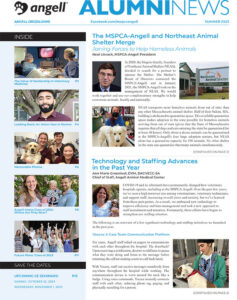
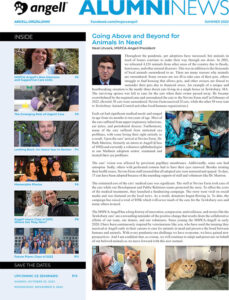
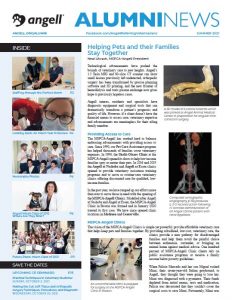
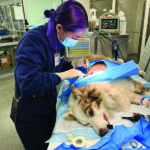 Angell Internships – Then and Now
Angell Internships – Then and Now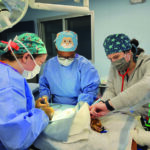 Looking Back: An Intern Year in Review
Looking Back: An Intern Year in Review